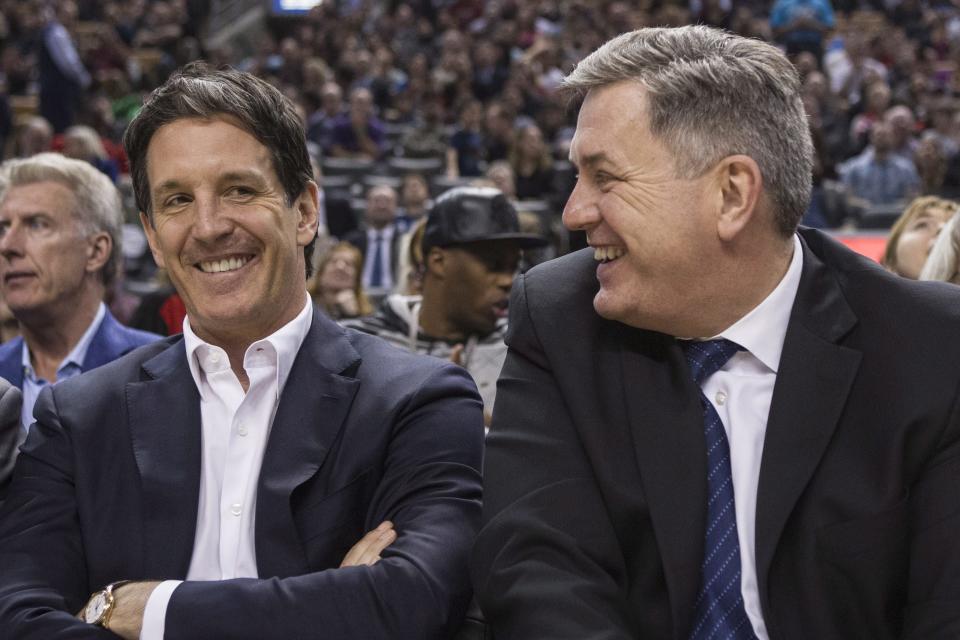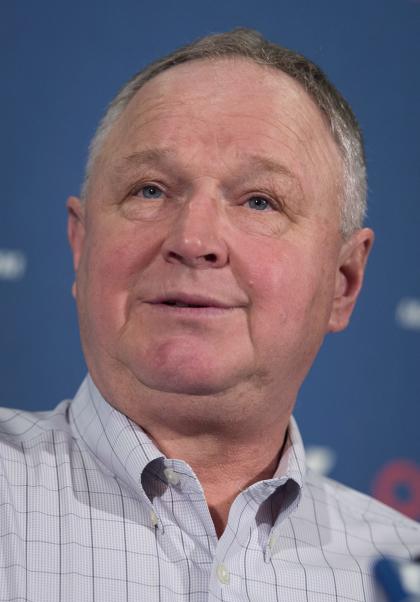Brendan Shanahan has made Maple Leafs bulletproof (Trending Topics)

If you've paid even the slightest bit of attention in the last two years or so, you're fully aware of the controversy surrounding the Toronto Maple Leafs and their direction.
Under coach Randy Carlyle and general manager Dave Nonis, they tried to build success on the concept of toughness, more or less by itself, ever since Brian Burke was fired before the commencement of the 2013 lockout-shortened season. This continued Burke's work, in a way, because no one values “pugnacity” and “truculence” — fancified 50-cent words for stocking a roster with players that aren't even worth that much — more than him, but Nonis and Carlyle seemed intent to double down on the concept.
They have largely failed. Apart from the brief playoff appearance in that season, driven mainly by a run of unrepeatable luck and the fact that the campaign was 48 games long and not 82, the Leafs have been a disaster. Nonis and Carlyle swore by their process, but when it didn't produce, their bosses brought in some insurance.
Hiring Brendan Shanahan earlier in the offseason to be team president marked a big change for the organization that had previously stood by Nonis and Carlyle's decisions, no matter how questionable. Where before there was little accountability, it's already been made clear that the buck — of which the Leafs have more than any other NHL team — stops with Shanahan, effectively rendering Nonis an assistant GM who gets to put in his input just like everyone else, but doesn't have a ton of say beyond that. Like Greg Sherman in Colorado, he's apparently GM in name only.
This is an alarmingly shrewd move for a guy who's never been any kind of team executive before. Nonis may have had the confidence of Leafs upper management for a long time, but the failure to make the playoffs — or even come close — this past season seems to have been the last straw; there would be no one else to protect him from the slings and arrows hurled by pretty much everyone in the hockey media save for some of the more shameless sycophants in Toronto, who still need Nonis for a scoop, or might run into him at a family function.
Shanahan took the job as the Leafs were being shelled with criticism for sticking by their guns even as they'd long ago run out of bullets. The Leafs' system allowed them to be badly outpossessed and still be competitive, but it was a sham; and Nonis had really only succeeded in letting some of the team's best players walk — whether through simple unrestricted free agency or after being bought out — while “bolstering” his roster with guys like David Clarkson (who was hilariously overpaid the day he signed, before he played a single game of his disastrously unlucky 2013-14 season, from which he's almost certain to rebound) and not much else.
Leafs fans largely wanted blood, with even the fans who were most disinterested in the underlying statistics howling mad at the team's direction.
Shanahan promised changes would be made, and they came quickly and harshly. All of Carlyle's assistants were fired. Two assistant GMs went not long after that. It was unclear, however, what would come next. And that was Shanahan's real stroke of genius: He hired 28-year-old Kyle Dubas, previously general manager of the OHL's Sault Ste. Marie Greyhounds, to be an assistant GM.
Perhaps the most vocal critics of the Leafs' performance over the last few years was the dreaded and long-derided “advanced stats community,” who viewed the Leafs more or less as a living referendum on the efficacy of the believes they'd been espousing for years. About possession, about the usefulness of the enforcers Carlyle insisted on dressing every night, about zone entries and exits, and about forechecking schemes that maximize turnovers before the other team gets to the red line. All the data these people compiled basically said that the Leafs were always going to fail under Carlyle's “system,” and every time the Leafs lost — which was often — there were a lot of told-you-sos flying around. Every time they won, there followed a lot of yes-buts.
The thing fans need to keep in mind in sports isn't results, necessarily, but rather how those results are achieved. The Leafs having some of the worst possession numbers in the league for years indicated that any success they had would be fleeting unless something changed, but the results over about 70-some games across in the last two seasons (beginning Jan. 2013 and ending more or less in Dec. 2014) said different. When the Leafs inevitably collapsed under the weight of their own broken process, the calculator crew of advanced-stats evangelicals were able to told-you-so with renewed and never before seen vigor.
The Maple Leafs, to them, represented Big Market Sports at their worst: Smug self-satisfaction and an indefatigable overinflated sense of self-worth in everything they did — and utter dismissiveness of anything that would question them — simply because they spent a lot of money and weren't losing right at that very second. The Leafs basically lit $65 million or more on fire every year in their doomed pursuit of what, exactly? A first-round playoff loss at best?
But at least their opponents thought they were “hard to play against.”

The fact that Toronto is sixth in the league in cap obligations this year, with that roster, is mind-boggling.
And so if you were to create a front-office type in a laboratory who would best appeal to these nerds who don't watch the games, Dubas would likely be the guy you came up with. He had considerable success with a small-market OHL franchise — building his team's points totals every year — by utilizing data that other teams in his league were not. He's young, he's smart, he follows a bunch of analytics guys on Twitter, and his rise from "Youngest Agent in NHL History" to assistant general manager in the biggest hockey market in the world has been meteoric. When the hire was announced, there was giddy rejoicing.
In the week or so that followed, the Leafs made a number of savvy moves, as well. They signed Daniel Winnik, a corsi darling who never puts up more than 25 or 30 points and never will, for one year and $1.3 million. They extended Jake Gardiner — a very good, young, puck-moving defenseman who was often criticized and misused by Carlyle — for five years at a terribly attractive $4.05 million per. They locked down solid 1b goaltender James Reimer for two more years at $2.3 million, and might even keep him despite more than a year's worth of trade rumors.
Every move was met with the same approval: “Look at the effect Dubas and Shanahan are having. They finally see the light. They're making smart decisions.”
But remember that thing about Shanahan ultimately having final say on every transaction? Well, a lot of the Leafs moves earlier this summer still came under criticism. They gave three years at $3 million per to Stephane Robidas, a defensive defenseman who's already 37 and coming off a broken leg. (An additional note: Defensive defensemen are usually considered defensive because they're not good at offensive things, which is bad.) They gave moderately useful defensive forward Leo Komarov almost as much for four years to come back over from the KHL. They signed Roman Polak for nearly as much over two years despite the fact that the only thing Polak does well is fight, and there were already a number of guys on the Leafs roster that fit that description perfectly.
But every time those moves were announced, the reaction was the same: “Goddamn Nonis, man. He'll never change no matter what.”
This is why Shanahan is brilliant.
By hiring Dubas and talking about how he doesn't want to puke every time he hears the word “corsi,” he looks like this revolutionary new figure, riding into Toronto on a donkey to save the Leafs from their previously wicked, disbelieving ways. And by keeping Carlyle and Nonis around while firing all their lackeys, he also leaves himself a few scapegoats to sacrifice when the team continues to stink this season (which they almost certainly will, even despite Carlyle's allegedly revamped systems).
He's bought himself a good four or five years of goodwill and job security with those two simple decisions, of hiring the “stats guy who's not just a stats guy” and canning all the “morons who were bad at their jobs which they only got because of the NHL's good ol' boys network.” Every positive move he makes from now on will be hailed as inspired, and every negative one dismissed as the rotten remnants of a hockey mind stuck in the early 2000s.
If things go really poorly, he can fire Carlyle midseason, bring in someone the analytics community respects, and ride out the storm. One more bad free agency period and Nonis will probably be gone to. Let Dubas take a whack at it after he's had a few more years on the job, and any time the team still struggles, fans will be able to say, “Well, look at how far he was set back. You have to give him a while to build the team his way.”
As long as The Process is now moving in the right direction, fans are likely to give it a few years before they need the results to catch up. They can still high-five when the team signs Dustin Penner types for pennies, or avoids paying for tough veterans like Shane O'Brien.
Any success the team has in the short term will likely be minimal. Minimal success, though, will be welcomed joyously for a fanbase that rightly sees itself as having long suffered under guys who just don't get the modern game. The bar for winning approval with these fans is so low it can be stepped over, but Shanahan has pole-vaulted it anyway, just for the style points.
And none of this, by the way, is to say that Shanahan is doing these things for cynical or political reasons. We have every reason to believe he fully supports the use of additional data to determine the best ways to run a hockey team, and he wouldn't hire Dubas if he thought it was anything less than a good idea. By all appearances, he is very earnestly and smartly reshaping the franchise in a way that will make it both competitive and cost effective, in a way that, say, the Los Angeles Kings are.
For a guy whose hiring was met with a lot of quizzical looks, Shanahan has quickly shown that he might actually be very good at this. If not with the actual team-building part of it, then at least in terms of becoming well-liked. He's the first Toronto executive to be either one in quite a while.
Ryan Lambert is a Puck Daddy columnist. His email is hereand his Twitter is here.

 Yahoo Sports
Yahoo Sports 

